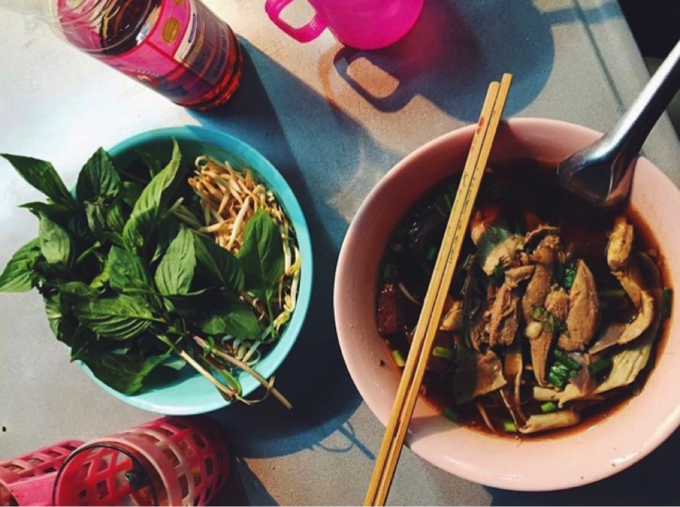
The Pure Joy of Eating Noodles Alone with Reckless Abandon

The Pure Joy of Eating Noodles Alone with Reckless Abandon
Boat Noodles in Bangkok
If you had told me three years ago, as I sat at my cubicle in New York, that I’d be living in Yangon—and that Bangkok would be the place to go when I needed my fill of Eggs Benedict, skyscrapers or a well-stocked 7-Eleven—I would have choked on my $13 salad.
This is my sixth trip to Bangkok in two years, and each time it gives me the anonymity I crave in Yangon. While Bangkok has no shortage of Michelin-starred restaurants, night-market snacks, cafés, and burger joints, I’m usually looking for a blue cart attached to a motorcycle selling Thai boat noodles. After the government’s recent ban on street vendors, they’re getting harder to find.
This time, I’m on my way to the Myanmar embassy at 8:30 a.m., sweating from the dry morning heat. I’m enthralled when I spot an aproned woman behind a blue cart and hope it is still there after hours of visa renewal anguish.
Two hours later, she’s still there. My Thai is limited, so I point to the grilled pork meat, smile, and the woman nods behind the glass. She stuffs rice noodles into a golden strainer, dips it into boiling water and dumps the noodles into a plastic bowl. Then, she tops the noodles with pork strips, sprigs of morning glory and pig’s blood-infused broth. The soup consists of nam tok or pig’s blood, garlic, soy sauce, radish, cinnamon, and paprika.
I plop down on a silver stool. The woman delivers the bowl. I douse the noodles in vinegar-soaked chili peppers, scatter basil leaves and bean sprouts on top—tucking them in the soup with my wooden chopsticks—and devour the bowl in seconds. With a lull in customers, the cook looks over and nods when I signal her for another bowl. This time, I make sure I’ve got meat, noodle, and rich broth in each spoonful.
Eating noodles alone with reckless abandon is an act of pure joy. Soupy noodles remind me of home, of Mom making ramen with a poached egg for me as a midnight snack, of late nights in university when I recreated her simple recipe, of every time I sought noodle soup in a lonely city for comfort.
With two bowls of boat noodles in my tummy, I pay the woman 100 baht, just over US$3. “Khob khun ka!” Thank you, I say.
Boat noodles (kuay teow reua) were originally sold from boats along the river. A cook would row, cook, season, wash dishes, and serve customers, all from his boat. Today, the noodles can be found in mall food courts and at Victory Monument, but I prefer the thrill of chasing the blue carts.
The street food ban has made sweaty, slurpy snacking much harder, but I hope that families haven’t been affected too much. My own parents hustled in America to feed their child by serving food to strangers. They still do. Food can be a transaction: sometimes for love, sometimes for money.
Up Next
A Fish (Sauce) Tale
Bangkok Rock
As an angsty 25-year-old, Jeremy Hartley found a home in Bangkok’s thriving punk scene by grabbing a guitar, writing some awful lyrics, and starting a band.
Drink, Edit, Repeat: Life at a Thai Newspaper
Strange days at Bangkok’s Business Day newspaper.
Serving Climate‑Friendly Meals, One Student at a Time
Food providers—large-scale companies that mass-produce meals for institutions like hospitals and schools—serve billions of meals annually in the United States. Despite their size, there hasn’t been nearly enough focus on how to cut their greenhouse emissions. Enter Coolfood, a one-stop solution to facilitate plant-forward, climate-friendly eating.
Eme Alfonso on old and new challenges for Cuban musicians
Eme Alfonso on Cuban music education, new challenges for Cuban musicians, and growing up as the daughter of Cuban rock royalty.






